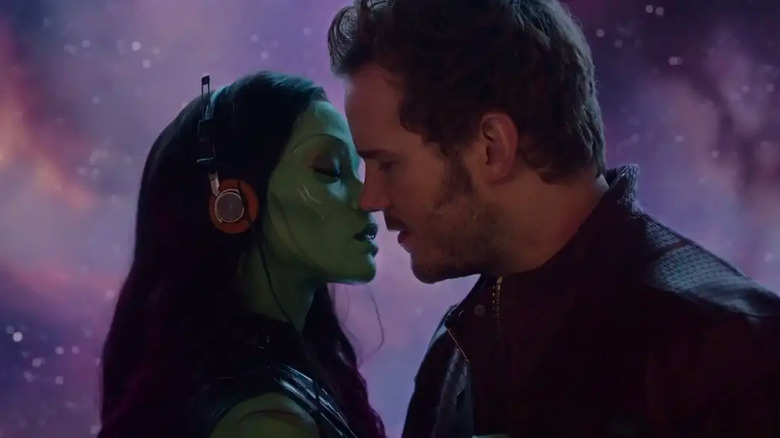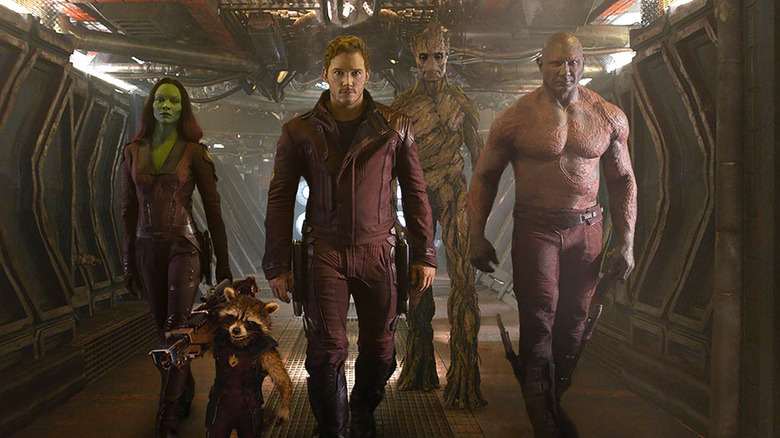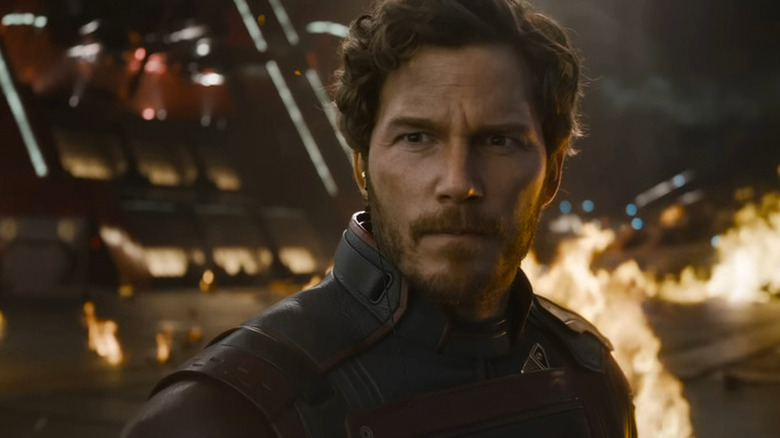James Gunn's Guardians Of The Galaxy Rewrite Started With The Soundtrack
"Guardians of the Galaxy" revolutionized the art of the modern movie needle drop. While James Gunn's meticulously curated soundtracks have taken on lives of their own outside of his films, the Awesome Mixtapes he's crafted for the "Guardians" trilogy are in a league all their own. Each song serves a narrative purpose, whether it be furthering the arc of main man Peter Quill (Chris Pratt), reinforcing his romance with Gamora (Zoe Saldana), or cementing a bond with the Guardians on the whole. Some songs, of course, just add a heightened cool factor to a splashy sci-fi action — but the music is clearly important to Gunn. It's why so much of the music in "Guardians of the Galaxy" feels like a natural extension of the narrative: most of Gunn's needle drops were written into the script before production even began.
When Gunn was tapped to direct the film in 2012, he inherited a screenplay from writer Nicole Perlman. "It didn't 100 percent speak to me," Gunn admitted in 2014. That led to an extensive rewrite, but it also allowed Gunn to make music a fundamental part of the story:
"[T]he very first thing that I thought of was this idea of the walkman and the cassette tape, which is really this character's connection to his home planet of Earth. That was the emotional center of the movie. It was just a natural part of the screenwriting process that all those songs that you hear in the movie were all written into the film, and they're all part of the screenplay."
'The perfect groove'
The process of integrating the songs into the script was not an easy one. While a lot of filmmakers typically lean on a music supervisor to help craft the soundtrack, Gunn did most of the work alone, alongside his rewrites. Narratively, it made sense to keep things rooted in '70s pop. The two mixtapes that Quill kept from his childhood on Earth aren't just anchors to his heritage: they're also time capsules of a sort. Gunn worked hard to choose recognizable songs, if only to help "ease the audience" into the world of the film.
"I started the process by reading the Billboard charts for all of the top hits of the '70s," Gunn told Vulture in 2014. "I downloaded a few hundred songs, and from that made an iTunes playlist of about 120 songs, which fit the movie tonally."
Certain songs inspired specific scenes that Gunn added to the script; other times Gunn used a piece of music to elevate a scene that had already been written. After completing the script, Gunn brought the songs to the set as well: "'Ooh-Ooh-Child,' 'Hooked on a Feeling,' 'Come and Get Your Love,' and more were all played on set by our marvelous sound team. I find it helps the actors and the camera operators to find the perfect groove for the shot."
A complicated collaboration
Apart from music, Gunn brought a handful of characters — like Quill's surrogate father Yondu (Michael Rooker), Gamora's sister Nebula (Karen Gillan) and the antagonist Ronan (Lee Pace) — and his own irreverent, odd-ball humor to the mix. "Guardians of the Galaxy" wouldn't be same without any of it, and he's the main reasons these movies work, but none of it would have been possible without Perlman's initial work on the project.
Gunn's been weirdly dismissive of Perlman's initial "Guardians" draft (as well as their joint screenplay credit) in the past, but Perlman still deserves major props for what she managed to accomplish. It was Perlman who first put her faith in a bunch of a-holes from an obscure corner of the Marvel universe: as an alum of the Marvel Writing Program, Perlman could have developed a number of better-known comics for the big screen. Still, she chose the Guardians, and spent two years coming through comics, selecting characters, and building the foundation that would eventually inform Gunn's finished product.
Clearly rewrites were essential to making the film and its sequels what they are — runaway hits with unforgettable soundtracks and some of Marvel's most beloved characters — but one can't really exist without the other. Crafting a film is a collaborative process for a reason: there's room to admire both Gunn and Perlman's contributions, since both contributed to a fantastic finished product.


